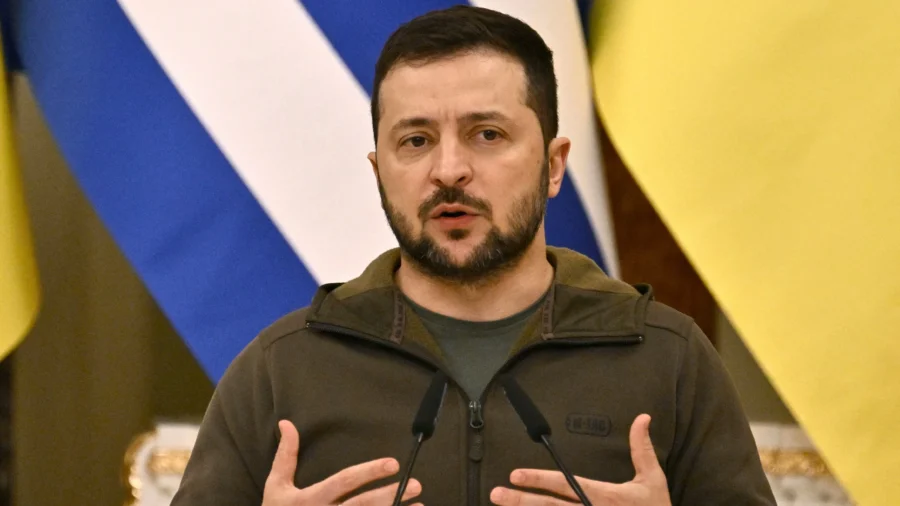Russia and Ukraine have agreed to another prisoner swap deal, the United Arab Emirates’ (UAE) Ministry of Foreign Affairs said.
In a statement released on Saturday, the ministry said its efforts to meditate between the Russian Federation and Ukraine had resulted in another successful agreement to facilitate the exchange of prisoners between the two waring nations.
The two nations have completed “a new prisoner exchange process that included 230 prisoners, equally divided between the two sides,” it said.
The talks were the seventh round of successful mediation by the UAE, according to the statement. Such negotiations have resulted the two sides exchange a total of 1,788 prisoners—the first which was secured at the start of the year.
“This achievement, which comes about a month after a previous successful mediation, reflects the UAE’s commitment as a trusted mediator for both parties in supporting the diplomatic path to resolve the crisis between the two countries,” the ministry said.
It added that its success to meditate between Russia and Ukraine “embodies the friendly and partnership relations” shared by the UAE with the two countries, and the UAE’s “continued efforts to support all efforts and initiatives aimed at reaching a peaceful solution to the conflict.”
“Dialogue and reducing the level of tension are the only way to resolve the crisis, which will contribute to mitigating the resulting humanitarian impacts,” it added.
Ukrainian President Volodymyr Zelenskyy thanked the Ukrainian team and the UAE for “bringing our people back home.”
He said a post in X on Saturday, “Another 115 of our defenders have returned home today. These are warriors of the National Guard, the Armed Forces, the Navy, and the State Border Guard Service.”
“We remember everyone,” Zelenskyy said. “We are searching for them and making every effort to bring them all back.”
Prisoner Negotiations
The UAE’s ministry noted that its partnership with Russia also played a key role in securing the prisoner exchange agreed to by the United States and Russia in December 2022.
In the exchange, American women’s basketball player Brittney Griner was released in exchange for notorious Russian arms dealer Viktor Bout.
Griner was arrested in 2022 in Moscow for carrying vape cartridges containing cannabis oil, which is illegal in Russia. She had been sentenced to nine years in a Russian penal colony.
Meanwhile, Bout—known as the “Merchant of Death”—had been serving a 25-year U.S. prison sentence after being convicted in 2011 on charges related to conspiracy to kill U.S. citizens and providing aid to a terrorist organization.
The exchange took place in Abu Dhabi, UAE, with both parties being swapped on the tarmac at the airport.
The deal was criticized for not securing the release of former U.S. Marine Paul Whelan, who was detained in Russia in 2018 and later sentenced to 16 years on espionage charges.
The White House said that Whelan was never offered as an option by the Russians. “They treat Paul differently because of these sham espionage charges,” White House spokesman John Kirby said at the time. “He is put in this special category by the Russians.”
Whelan said in an interview with CNN that more should be done to secure his release.
Former secretary of state Mike Pompeo said that under the Trump administration, it was policy that prisoner swaps would not involve celebrities, as it risked creating the wrong incentives and made international travel for Americans less safe.
In August this year, the Biden administration secured Whelan’s release in a multination deal mediated by Turkey.
Whelan was released alongside Wall Street Journal reporter Evan Gershkovich, Radio Free Europe journalist Alsu Kurmasheva, and U.S. green card holder activist Vladimir Kara-Murza for the United States, five Germans, and seven Russian citizens who were political prisoners.
In exchange, Russia sought eight nations, including some with ties to Russian intelligence. Among them was Vadim Krasikov, who was convicted of murder in Germany in 2019, which the judges in his case described as an assassination ordered by Russian authorities.
The Aug. 1 deal, involving 26 prisoners, was the largest prisoner exchange since the Cold War.
Andrew Thornebrooke and Jack Phillips contributed to this report.
From The Epoch Times

